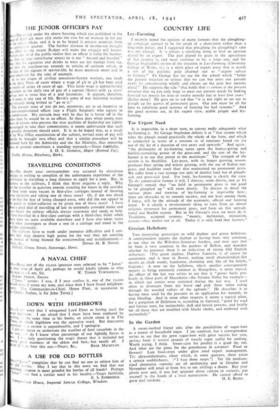THE JUNIOR OFFICER'S PAY —The article under the above heading
which you published in the e of April 4th most ably states the case for an increase in the pay the jun:or officer, and it is to be hoped it attracts attention from appror quarter. The further increase in income-tax brought o effect by the recent Budget will make the struggle still harder. rhaps not all of the public realise that an officer is liable for income- that (as your contributor states) he is not " housed and boarded " e, that his cigarettes and drinks in mess are not exempt from tax, that the purchase-tax extends to articles of uniform which, in e face of the rigours of service-life, he must maintain smart and in condition for the sake of example.
As to the wages of civilian armament-factory workers, one reads the daily Press of cases where a wage of £6 to £8 has been paid youths of under 18 years of age. This latter wage is approximately uivalent to the daily rate of pay of a captain (Army) with 14 years' ice and is twice that of a znd lieutenant. It appears, therefore, if some at any rate of Mi. Bevin's army of war industrial workers virtually being bribed to " go to it."
The present rates of pay do not, moreover, act as an incentive to non-commissioned officer (say a Flight Sergeant) who aspires to commission. His attitude may well be that he is better off in the s than he would be as an officer. In these days when young men m all classes who possess the true qualities of leadership are rightly couraged to take their commissions, it seems unfortunate that such possible deterrent should exist. It is to be hoped that, as a result the War Office examination of the subject, revised rates of pay will rtly be brought into effect and that a similar procedure will be !lowed both by the Admiralty and the Air Ministry, thus removing hat at present constitutes a standing reproach.—Yours faithfully, I. D. S. GORDON, Major (Retired Pay). Treble House, Blewbury, Becks.


























 Previous page
Previous page